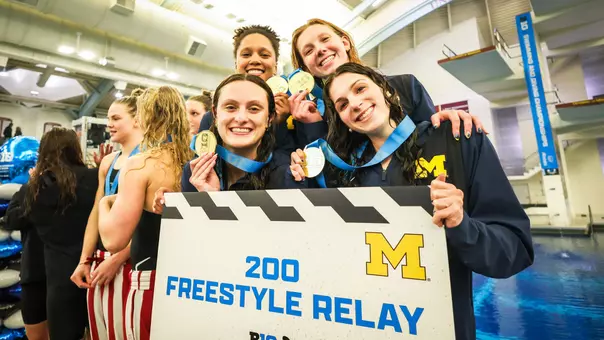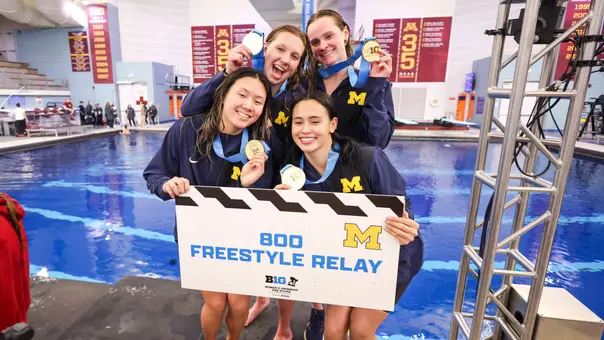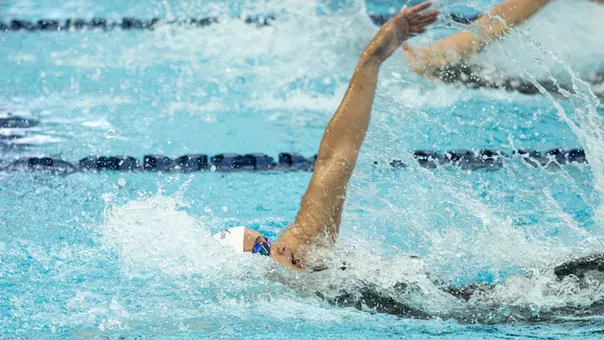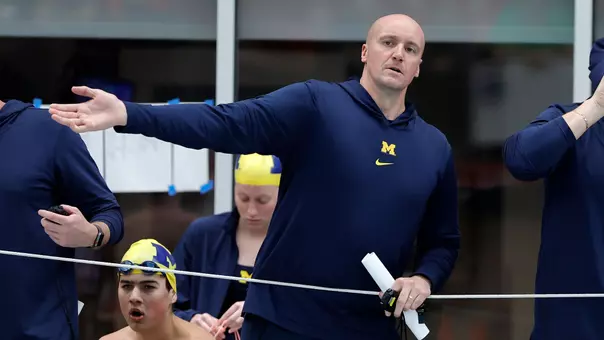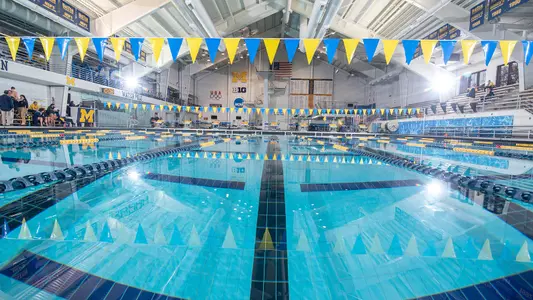
How Michigan Swimming and Diving Navigated Through Fall of Sudden Change
12/14/2020 10:00:00 AM | Men's Swimming & Diving, Women's Swimming & Diving, Features
By Brad Rudner
Everything was set.
Despite some bumps and detours this fall, the University of Michigan swimming and diving program was finally ready to race. They had waited patiently for the opportunity, a chance to show everyone -- and themselves -- that progress was possible in the middle of a pandemic.
Then on Sunday, Nov. 15, the Michigan Department of Health and Human Services issued an emergency order pausing certain activities for three weeks to try to slow the spread of the coronavirus. The restrictions meant that the majority of college sports had to stop unless they met "extraordinary standards for risk mitigation."
The order went into effect three days later on Nov. 18. Because of it, the four-day meet the Wolverines had planned to begin later that week at Canham Natatorium could no longer happen.
"When something you're training the entire first semester for is abruptly canceled, there's a sense of incredible disappointment," said head coach Mike Bottom. "We had to deal with that. We had to acknowledge the loss and then we had to find a Plan B when we didn't have a Plan B."
Facing a hard deadline with time running out, Bottom had no choice but to improvise. The night after the announcement, on Monday, he called up Bill Case, a registered official with USA Swimming, to try to get a meet organized for the next day in lieu of its scheduled practice. Case agreed and the meet was officially approved by morning.
Since the order had come down, the coaches were flooded with questions from swimmers wondering what was going to happen. In an email to the team on that Monday night, appropriately titled Sudden Change, Bottom laid out the plan.
It is important to understand that in a normal year at this time, Michigan swimmers would be at a midseason meet racing to better their odds of qualifying for the NCAA Championships. Those meets are designed to mimic championships with events stretched out over multiple days with two sessions, preliminaries and finals, usually occurring each day. Most swimmers generally arrive at those meets with some level of rest so they can swim faster.
Instead, because of the order, the Wolverines were forced to cram four-days-worth of events into two two-hour segments. What's worse, they had less than 18 hours to prepare for it.
"It hit like a ton of bricks," said junior Mason Hunter.
With their rivals in peer conferences racing as normal, the majority of the Wolverines were left to compete only against each other, their own expectations and, of course, the clock.
Light on rest and preparation, the swimmers suited up at Canham on that Tuesday. COVID-19 safety protocols meant one group raced from 2:30-4:30 p.m., the other from 4:30-6:30 p.m. Knowing the immediate future looked hazy, at best, it was better than nothing.
"It was hard, I won't sugarcoat it," said senior Sierra Schmidt. "But I was impressed with how well everyone was able to turn on their heels and prepare for a meet that was happening in less than 24 hours. Stuff like that puts into perspective how resilient this team is and how we're able to roll with the punches in a world where things can change so quickly."

Schmidt
Despite the last-minute changes, the results were actually pretty good. Freshman Kathryn Ackerman blasted a 4:05.58 in the 400-yard individual medley, setting a school record by nearly two seconds. Schmidt (4:41.13) and Kaitlynn Sims (4:42.10) looked sharp in the 500-yard freestyle. Sophomore Mariella Venter went faster in the 200-yard backstroke (1:55.28) that day than she did 10 months earlier at the Big Ten Championships.
Hunter crushed a 51.88 in the 100-yard breaststroke, shaving nearly a second off his old personal record to become the fifth-best performer in school history. He also clocked a 1:54.75 in the 200-yard breaststroke, surpassing Eric Wunderlich to No. 9 on the school's all-time performers list. Sophomore Cam Peel went 19.67/43.59 in the 50- and 100-yard freestyles, adding a 19.11 split on the anchor leg of the 200-yard medley relay. Junior Jared Daigle set PRs in both the 200-yard backstroke (1:43.51) and 400-yard IM (3:48.28).
That is not even mentioning the handful of swimmers who were not yet cleared to compete after returning to campus from the U.S. Open.
"Had the initial plan stuck, at least nine-to-10 people would've made the NCAA cut, no question," said Bottom. "The situation was tough, but they didn't look at it that way. They looked at it as an opportunity, maybe their last opportunity, to swim fast. That's how things are these days. You have to take every opportunity like you aren't going to have it again."
For a program that prides itself on the strength of the team, these last few months have been infinitely challenging. One week after classes began in late August, the Wolverines mourned the loss of teammate Ian Miskelley, an unbearable tragedy that left the entire team shaken.
Looking back, now some three months later, Hunter still finds himself at a loss for words.
"For a long time, I was in this state of denial," Hunter recalled. "I thought to myself, 'No, this can't be real. This has to be some kind of nightmare.' It was so hard.
"The biggest thing for myself, and I think a lot of others can identify with this, was the fact that we were together in that moment, right after we heard. I don't think I could've gone through it without having the team there. We leaned on each other."

Hunter
For those who wanted to swim, their own pool at Canham was unavailable for the first week and a half of the season because of restrictions on indoor pools put forth in an executive order from Governor Gretchen Whitmer. Bottom worked the phones to find an outdoor pool that could accommodate the team for training, and found a partner in The Chippewa Club in neighboring Ypsilanti.
Some swimmers did not come back to campus right away. Others, mainly a smaller group of internationals, elected to stay home altogether. Training cycles were disrupted, keeping some out of the water for days.
Throughout all of that, the team persevered.
"A lot of things have happened with this team, but instead of being torn apart, they've come together," Bottom said. "This team has looked into each other's eyes and has supported each other in those moments. There's nothing short of love in the present. We're treating each other with respect and acknowledging that everyone is going through this together."
Outside the pool, Schmidt and her fellow captains have held multiple meetings to brainstorm creative solutions to keep longstanding traditions alive without putting anyone's health at risk.
A perfect example is painting "The Rock". Instead of going to the corner of Washtenaw Ave. and Hill St., like they would do every year under normal circumstances, Alex Hughes came up with the idea to get everyone on the team their own smaller rock that they could paint themselves. A little thing, but it brought the team together.
"The fact that we have so many people invested in a season that's wrought with challenges," Schmidt says, "is a testament to how amazing this group of individuals really is."
Regarding what lies ahead, hope is high. There's talk of beginning competition in January and of having a Big Ten Championship. Once again, there is something to look forward to while acknowledging that things can -- and likely will -- change.
And should sudden change happen, the Wolverines will be ready. They have gone through plenty of it already.
"The way we go about the future is the same way we went about that Tuesday meet," Hunter said. "We're going to do our best no matter what the circumstances end up being. We're going to do what we came here to do, enjoy it together and take any opportunity we can to compete.
"We'll be prepared for whatever comes."

